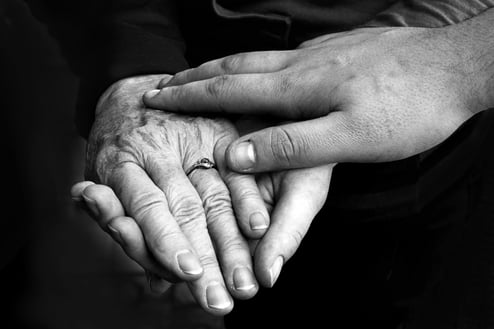Help Them Quit Smoking

If your loved one is still smoking, this is probably the most important thing you can help them with. Chances are smoking has led to their COPD and if the smoking continues, the symptoms will gradually get worse. Some things you can do to help your loved one kick the habit are:
- Read and download our Quit Smoking Guide!
- If you smoke, don’t smoke around your loved one. If you’re going to be around your loved one, don’t smoke before you see them. You will smell like smoke and could make your loved one crave a cigarette. Make sure you take cigarettes, lighters, or anything that could remind your loved one of smoking out of your car or any other place they will be with you.
- Complete a sweep of your loved one’s house and remove all items that could trigger them to want a cigarette. This includes cigarettes, ashtrays, and lighters. Talk with your loved one and ask for any other triggers that are around that remind them of smoking and get rid of them if possible.
- You need to be a distraction from normal everyday triggers that your loved one will struggle with. Be there to go for a walk, play a game, or help your loved one develop new, healthy habits that they do not associate with smoking.
- For some people, healthy snacks and vegetables help with cravings. Keep a healthy stock of these so your loved one can reach for these versus a cigarette.
Positive reinforcement is key when your loved one is craving a cigarette or gives into the temptation and has a smoke. It’s ok if they fail. Concentrate on how long it has been since they had a cigarette and praise them for that rather than being hard on them for the minor relapse. - Ensure your loved one drinks plenty of water. Water keeps your body at tip top shape and helps flush toxins from your system.
Develop a Plan for Completing Daily Chores
Daily life for your loved one will need to change. Chores they completed daily may not be as easy to complete now. It’s important for you to help, but you can’t be there all the time. Look at some ways you can make your loved one’s life a little easier: - Spread out what needs to get done through the week. Help your loved one plan to tackle a few items a day and slowly work to completion.
- Organize their home by placing commonly used items below shoulder height. You do not want your loved one to overexert themselves and cause needless use of energy. Some examples of commonly used items are: toasters, microwaves, pans, toiletries, kitchen items, books, computers, and clothing.
Set realistic expectations and limits for your loved one. Calculation of strategy needs to be smart, safe, and responsible so they will not overexert themselves.
Discover who is in your loved one’s circle. Whether it be church or community members, incorporate them into your loved one’s schedule. You don’t have to be the only one who is there for support. Take advantage of any help you can get so you will not get frustrated or burned out.
Help Your Loved One Understand the Different Treatments Available
Your loved one will have a variety of treatments they may or may not use. Some common treatments with patients with COPD are:
Medications to Treat Anxiety
Patients diagnosed with COPD are often prescribed an anti-anxiety medication. It is imperative that you help your loved one follow the directions exactly as prescribed for these medications. An overdose of these medications can cause a decreased rate of breathing, which makes their COPD worse.
Another issue with taking a new medication is a negative interaction to medications your loved one is already taking. Their pharmacist will cross-check the new medication, with all the other prescribed medications, to help prevent these issues. Therefore, it is important that your loved one’s doctors are aware of what medications they are taking, and that you help them get medications from the same pharmacy, so their drug profile is up-to-date and complete.
As with most drugs, a dependence or addiction may become a problem. The good news is that there are also non-addictive medications that do not decrease breathing, as well as natural or alternative medicines that can be effective. Always consult your loved one’s physician before starting any alternative therapies since there can be interactions with these and current treatments your loved one is receiving.
Pulmonary Rehabilitation
In partner with your medication, ask your loved one’s doctor about a pulmonary rehabilitation program. Pulmonary rehabilitation is essentially an exercise program for their lungs. These programs educate you about your loved one’s COPD and how to handle anxiety related to COPD. These programs are also a great networking opportunity to meet other people with COPD and learn how they handle anxiety related to their disease. Working together with respiratory therapists and pulmonary doctors, you will learn a customized rehabilitation program to help optimize your loved one’s breathing and decrease anxiety.
Counseling and Therapy
Cognitive behavioral therapy is a type of therapy that helps decrease anxiety with your loved one’s COPD through relaxation and breathing exercises, guided imagery, and by learning coping skills. Group counseling or support groups can help you learn from others about anxiety with COPD. These groups also reinforce that you are not fighting this alone and can lean on others with the same issues for help and support.
Support the Necessary Change in Dietary Needs
Your loved one’s dietary needs will change. For someone who has eaten the same way for years, this can seem like a daunting task. As a main support system, it is important for you to support and help your loved one in this change. Here are some of the dietary changes and ways you can help facilitate the change.
years, this can seem like a daunting task. As a main support system, it is important for you to support and help your loved one in this change. Here are some of the dietary changes and ways you can help facilitate the change.
Decrease your loved one’s salt intake. Ways to do this are to get rid of salt shakers, use salt substitutes and herbs, stay away from processed foods, go to healthy cooking classes, and have low salt recipes readily available.
Foods that cause gas can affect breathing and worsen COPD symptoms. Foods that can give your loved one gas can include yogurt, alcohol, beer, turnips, sweet potatoes, spicy foods, popcorn, peppers, peas, milk, eggs, aged cheeses, broccoli, or beans. This list is not meant to be exhaustive, so read up and decide which foods your loved one should avoid.
Foods to keep on hand and easily accessible when your loved one is ready to cook include: whole grain varieties, lots of vegetables, lean protein, legumes, low-fat milk or a nut milk, nuts, fruits, and plenty of water.
Consider healthy, quick options. There are microwave meals that use little to no salt and offer healthy choices. Supplementing these quick options throughout the week can make your loved one’s life easier.
When cooking, cook large meals. With the leftovers, put in appropriate containers and freeze to have a no-prep meal. This will come in handy on the days that your loved one is too tired to cook and can opt for an easy, healthy meal.
Conclusion
Each person diagnosed with COPD will have an individualized plan for treatment. Regardless of what that plan is, they will need support to adapt to the new changes in their lives. Your loved one needs you now more than ever. Take time to understand their COPD diagnosis, what it will take to make life as easy as possible with all the changes, and stay by their side every step of the way. At times it may be easier said than done, but you can do this and need to be a rock for your loved one to lean on.




